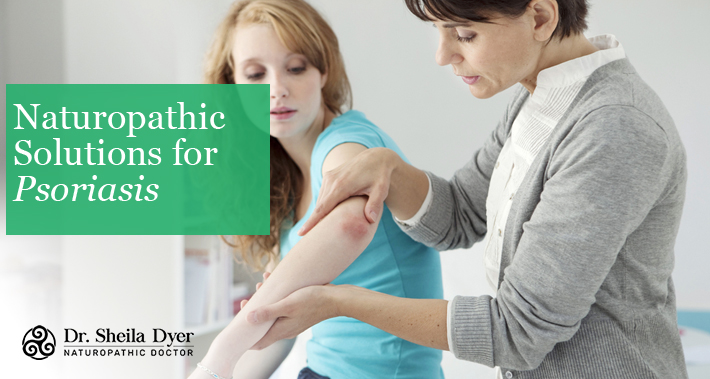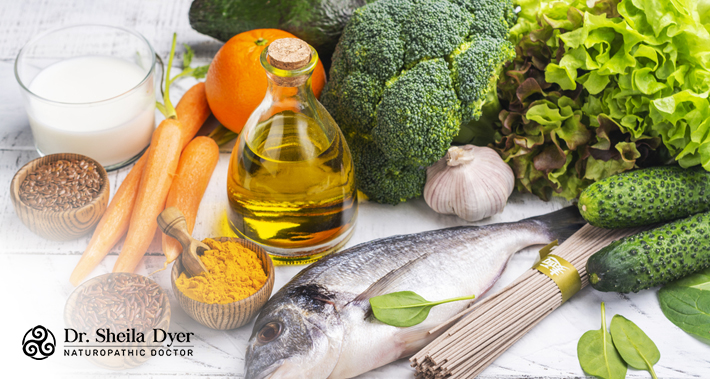It’s often said our skin is a good indicator of our general health.
Think about it – when you’re sick, it usually shows on your skin.
A rash could be the first sign of an underlying disease.
Pale, cool, and clammy skin often indicate issues with circulation.
And flaky, red, and scaly skin could indicate psoriasis, which is an autoimmune issue.
Today we are going to look at some naturopathic solutions for psoriasis which can help provide some relief if you have this condition.
Keep reading to learn more.
What Is Psoriasis?
Psoriasis is a skin condition which results in flaky, red patches of scaly skin, which generally appear on the knees, elbows, lower back, and scalp – however, it can show up anywhere on the body.
It’s an autoimmune disease which means the immune system mistakes part of the body as a foreign substance and as such, the body attacks itself.
Generally, as the body produces new skin cells, older ones fall off – this is the normal cycle for skin to regenerate itself.
In individuals with psoriasis, the production of new skin is sped up, and older skin cells don’t have time to fall off, resulting in a build-up of cells.
What Are The Symptoms Of Psoriasis?
Symptoms can vary depending on the type of psoriasis, however some of the most common symptoms include:
- Patches of skin which are raised, red and inflamed
- Swollen joints
- Pitted, thick nails
- Silvery-white scales on top of the red patches
- Itching sensation in the areas around the patches
- Cracked and dry skin
- Bleeding around the skin patches
- Soreness
You can tell psoriasis apart from eczema by these telltale signs: eczema causes much more intense itchiness and looks red but not generally patchy/scaly.
What Types Of Psoriasis Are There?
There are five types of psoriasis – let’s have a look at the difference between them.
Plaque Psoriasis
This is the most common type of psoriasis.
It’s estimated approximately 80% of individuals with psoriasis have plaque psoriasis.
It causes patches of inflamed, red skin which are usually covered by silver scales or plaque.
Areas affected are generally the scalp, knees, and elbows.
Pustular Psoriasis
Commonly found in adults, pustular psoriasis is generally localized to small areas of the body such as hands or feet.
It results in pus-filled blisters and large areas of skin becoming red and inflamed.
Guttate Psoriasis
Guttate psoriasis is more common in children than in adults.
It’s characterized by small, pink spots on the legs, arms, and torso.
Unlike plaque psoriasis, these are generally not thick or raised.
Erythrodermic Psoriasis
One of the most severe, but also the rarest types of psoriasis, erythrodermic psoriasis generally cover large portions of the body.
It looks like a sunburn and results in scales which slough off in large amounts at once.
Erythrodermic psoriasis can result in serious illness, fever and can be life threatening, so those who experience it should seek medical attention.
Inverse Psoriasis
Inverse psoriasis typically shows up beneath the breasts, armpits, around the groin, or in skin folds near the genitals.
It appears as shiny, red, and inflamed skin.
What Causes Psoriasis?
The precise cause of psoriasis is unclear, however there are two major factors which play a role, the immune system as well as genetic or hereditary factors.
It is possible to inherit genes which make you more likely to have psoriasis, and your risk for developing it increases if you have an immediate family member who has it.
That said, this risk is still quite minimal as only two to three percent of individuals with the gene for it will develop psoriasis.
Additionally, psoriasis is an autoimmune condition.
Specifically, this means white blood cells mistake the skin cells as foreign invaders and attack them.
These attacks on skin cells are the reason the skin becomes red and inflamed.
Naturopathic Solutions For Psoriasis
At this point in time, there is no known cure for psoriasis.
However there are ways to manage it, and natural solutions which can help to reduce the symptoms.
Let’s have a look at some natural solutions to help you manage psoriasis.
1. Eat A Psoriasis Friendly Diet
Eating a healthy diet high in omega-3 fatty acids has been shown to help combat inflammation.
Foods to focus on include fatty fish such as sardines, mackerel, salmon, and tuna.
Fish oil supplements are also a good option.
Additionally, the Mediterranean diet, which has an emphasis on whole grains, fish, fruits, and vegetables may help to keep symptoms under control.
2. Find Ways To Manage Your Stress
When you’re stressed out, it can cause your psoriasis to flare up.
Techniques to help reduce stress can include:
- Yoga
- Deep breathing
- Meditation
- Tai chi
- Massage
You can also consider these herbs that offer support in times of stress
3. Apple Cider Vinegar
Apple cider vinegar has been used for hundreds of years to provide relief for skin conditions and help manage itching.
In the 18th century it was used by doctors as a way to manage poison ivy, and in more recent years has become associated with providing treatment for psoriasis, especially on the on the head.
It can be used either full strength, or diluted with water, but this method shouldn’t be tried when the skin of the scalp is cracked or bleeding.
For psoriasis on other areas of the body try a bath with diluted apple cider vinegar.
4. Turmeric/Curcumin
Turmeric is for more than just curry sauce.
Its active ingredient, curcumin has a number of properties which would make it seem ideal as a way to provide treatment for psoriasis – it’s anti-inflammatory, antiviral, and anti-proliferative (inhibits cell growth).
A 2018 study in the journal Open Access Macedonian Journal of Medical Sciences showed curcumin to have some promise as a potential solution for psoriasis, but further research is needed on this subject.
5. Take An Oat Bath
Oats have been used in skin care since the time of ancient Rome.
They contain anti-inflammatory compounds, as well as those which help the skin to retain moisture.
You can purchase pre-made oat bath products, or make your own by grinding rolled oats into a fine powder.
Book An Appointment With Dr. Sheila Dyer, ND
Are you suffering from red, itchy, skin?
Do you think you might have psoriasis?
Or perhaps you’ve already received a diagnosis of psoriasis, and are looking for help to manage your symptoms.
I’m Dr. Sheila Dyer, a naturopathic doctor in Toronto, and I want to help.
Contact me today to set up an appointment, or for more information about how naturopathic medicine can help you.
If you have questions about naturopathic medicine, or would like to start with your first consultation, contact me, and let’s book an appointment.
Dr. Sheila Dyer, ND1080 Dovercourt Rd,
Toronto, ON M6H 2X8
(416) 554-5135
► https://g.page/DrSheilaDyerNd
Dr. Sheila Dyer is a Naturopathic Doctor and a practicing registered nurse offering holistic healthcare with a scientific focus

